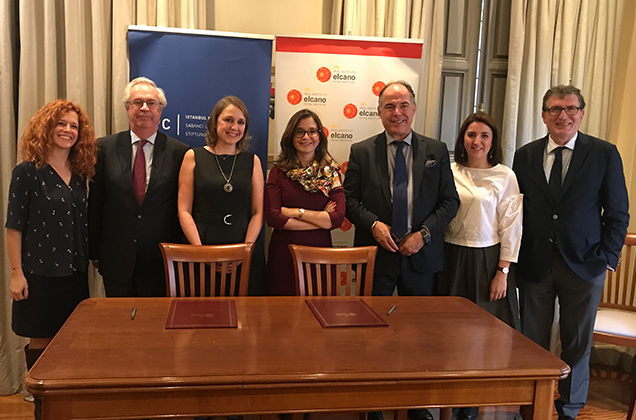19/11/2018
Sabancı University Istanbul Policy Center (IPC) held meetings in Madrid on October 18 and 19.

On October 18, the roundtable EU-Turkey Relations in Times of Global and Regional Turmoil organized jointly by Istanbul Policy Center-Sabancı University-Stiftung Mercator Initiative and Elcano Royal Institute was held at the Elcano Royal Institute.
Following introductory remarks by Elcano Royal Institute Director Charles Powell, the roundtable continued with 2017/18 Mercator-IPC Senior Fellow Atila Eralp, IPC Senior Specialist and Sabancı University Faculty Member Senem Aydın-Düzgit, IPC Director and Sabancı University Faculty Member Fuat Keyman, European External Action Service (EEAS) US and Canada Regions Director Javier Niño Perez, and 2015/16 Mercator-IPC Fellow and Elcano Royal Institute Analyst İlke Töygür.
The discussions focused on the revisions to the Customs Union Agreement, acquisition negotiations, migration and refugees, the Permanent Structured Cooperation Agreement (PESCO), security relations, economic integration, and transatlantic dimension. After the meeting, IPC Director Fuat Keyman and Elcano Director Charles Powell signed an agreement to further the cooperation with Elcano Royal Institute.
On the next day, the panel discussion EU-Turkey Relations in a Turbulent World – Cooperation or Conflict?jointly organized by Istanbul Policy Center-Sabancı University-Stiftung Mercator Initiative, Asociacion Nuestra Europa, and Universidad Carlos III de Madrid was held at Universidad Carlos III de Madrid.
Panelists 2017/18 Mercator-IPC Senior Fellow Atila Eralp, IPC Senior Specialist and Sabancı University Faculty Member Senem Aydın-Düzgit, IPC Director and Sabancı University Faculty Member Fuat Keyman, European External Action Service (EEAS) US and Canada Regions Director Javier Niño Perez, and Universidad Carlos III de Madrid Faculty Member Işık Özel spoke to a wide audience including university students.
Discussions focused on the past and present of EU-Turkey relations, the current position considering the recent developments on regional and global levels, the influence of the translatlantic dimension on the bilateral relationship, and the past of the Customs Union and its ongoing revision process.




